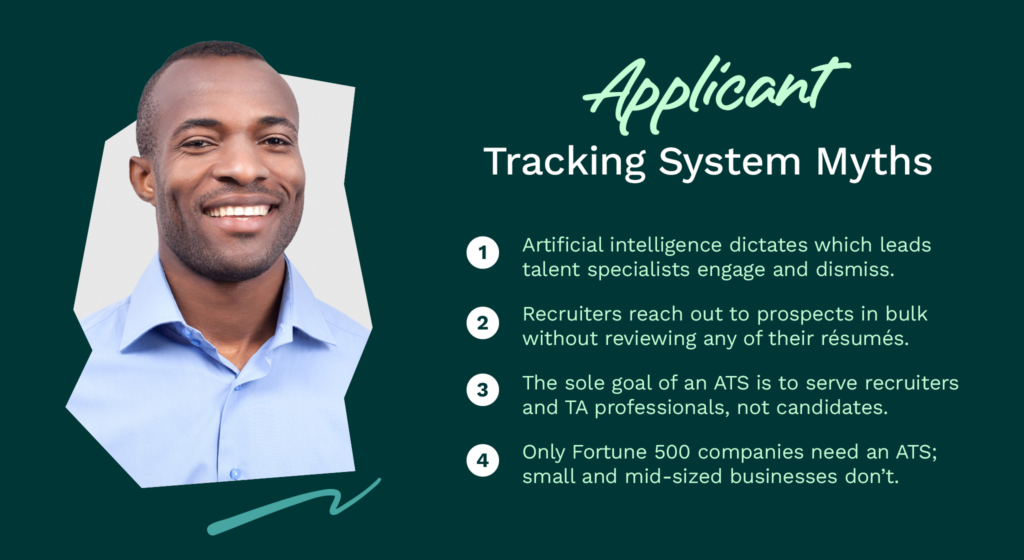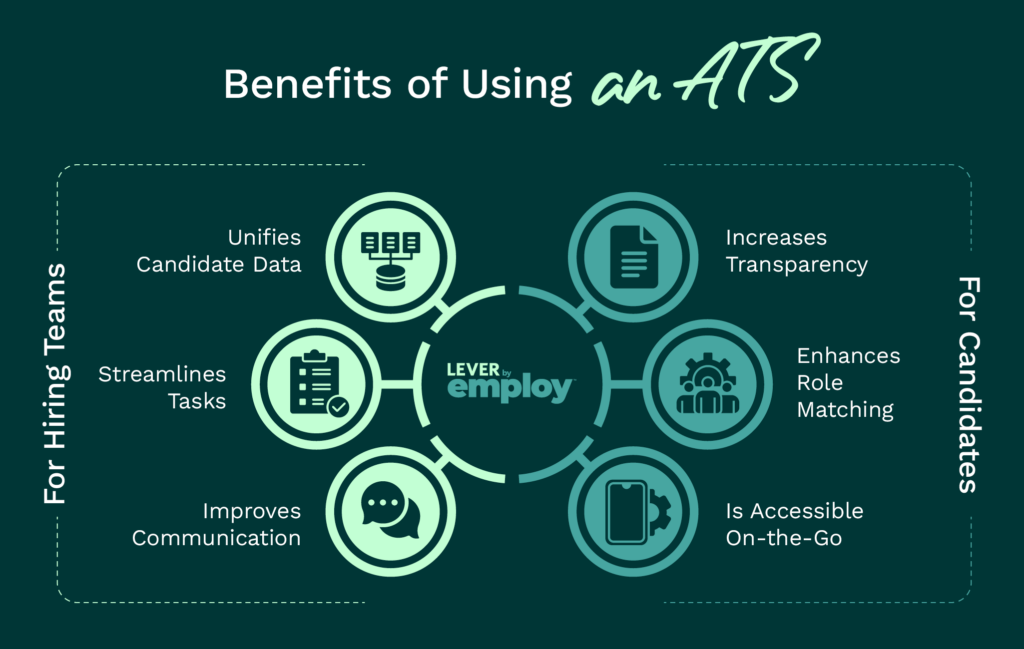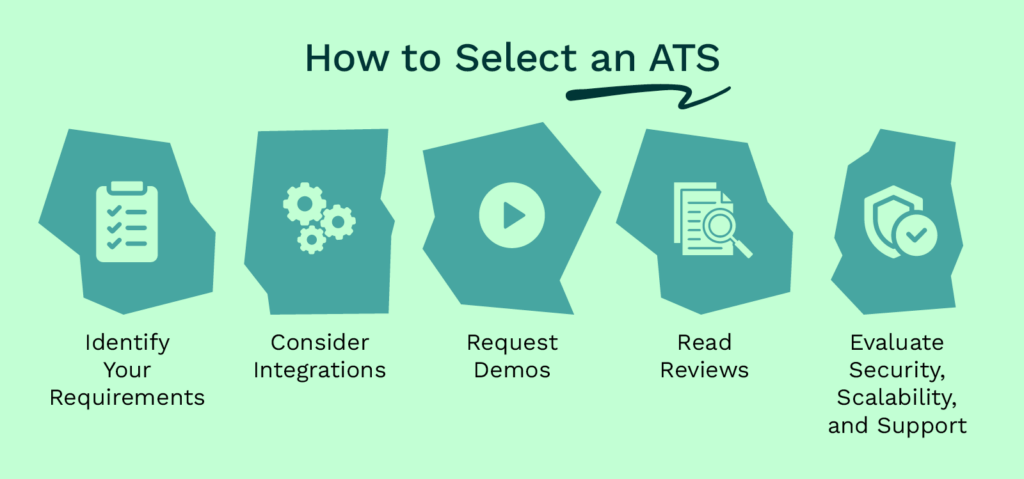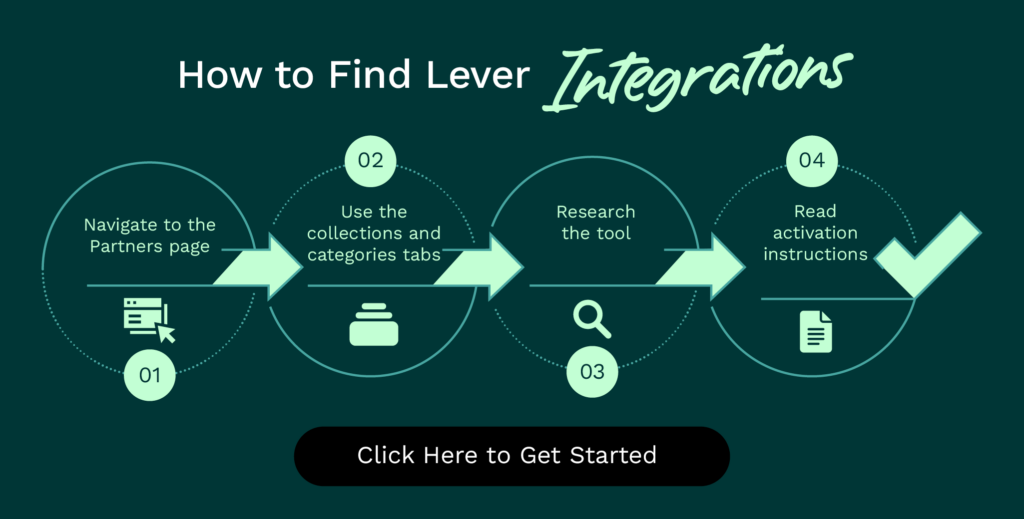Hiring teams can only attract the best talent by using the best tools. Furthermore, you need software that’s built for your hiring team’s unique needs. That’s where an applicant tracking system (ATS) comes in handy.
Recruiting teams use applicant tracking systems to manage job applicants and usher candidates through the hiring funnel. However, the term “ATS” gets tossed around so much that it’s even used to label solutions that don’t match the actual ATS definition. This error leads talent leaders to invest in the wrong tech.
In this guide, we’ll equip your team with everything you need to pick the ideal ATS, answering frequently asked questions, debunking ATS myths, and reviewing our recommended provider.
- Applicant tracking system FAQ
- Benefits of an ideal applicant tracking system
- Features your applicant tracking system should have
- How to select an applicant tracking system

Applicant tracking system FAQ
What is an applicant tracking system?
An applicant tracking system is a user-friendly solution used to track top candidates—those who apply for job openings, as well as passive prospects recruiters proactively engage for open roles—through the entire recruiting process: from resume-reviewing and interview-scheduling to feedback-compiling and offer-extension.
Look at the talent acquisition (TA) tech stacks that Fortune 500 companies use. For 99% of them, you’ll find a best-in-class applicant tracking system right at the center, helping recruiters better identify and engage qualified candidates and talent leaders analyze team performance.
What you won’t find in their tech stacks, though, are legacy ATS that deter efficient recruiting and hiring, preventing TA specialists from being highly productive and collaborative. As Lever’s ATS buyer’s guide states:
“Old-school ATS help recruiters review applications and resumes and move job seekers through the interview process. They also enable recruiters and other hiring stakeholders to hire for key roles. Once this process is over, though, all that data disappears into a black hole (i.e., becomes inaccessible and unusable for talent teams).”
A leading ATS is an indispensable recruitment and hiring platform that every organization—regardless of industry, size, or business model—needs to fill key positions across their companies.
What are the misconceptions about applicant tracking systems?
If you’ve been in the talent acquisition space for some time, you might already know everything there is to know about ATS—or so you think! In reality, you might have been misled by these ATS myths, but no worries—we’ve busted them for you.

- Artificial intelligence (AI) dictates which candidates TA specialists engage. While AI-powered ATS can screen and rank candidates based on their qualifications, the hiring team will still see all options, meaning they have the final say and can reach out to anyone they deem suitable.
- Recruiters reach out to prospects in bulk. ATS doesn’t bypass the resume review step altogether. Instead, it allows hiring teams to tailor personal, targeted communications more efficiently.
- The sole goal of an ATS is to serve recruiters and TA professionals. In reality, candidates have a lot to gain from using an ATS. ATS allows employers to nurture and connect with candidates, making the process more meaningful and engaging for everyone involved.
- Only Fortune 500 companies need an ATS. An ATS can benefit all organizations, from small businesses to multinational corporations. You just need to find the solution that best complements your budget, needs, hiring style, and technological prowess.
Benefits of an ideal applicant tracking system

For hiring teams
1. Unifies candidate data and details
Reliance on disparate tools and spreadsheets to store candidate information is a common pain point for talent acquisition teams worldwide. That said, the right ATS can be a single source of truth and declutter your team’s workload.
The best ATS centralizes all data points and information related to prospective hires. This helps recruiters easily discern who’s who in their database and, thereby, know which prospects are worth engaging for certain roles.
2. Streamlines and automates tasks
Not every recruiting activity can be put on “autopilot” through automation. However, you may be surprised by just how many of your team’s daily tasks can be automated, eliminating much of the tedious manual labor involved. For instance, ATS can automatically send communications, eliminate duplicate data, and schedule interviews based on candidate availability.
A great ATS provides a happy medium between overly automated and overly manual, making sure you don’t compromise your human touch or valuable time. Leading ATS providers like Lever help recruiters implement rules and workflows and, in turn, streamline their requisition, job posting, and offer approvals.
3. Improves communication and collaboration
Poor communication and a lack of communication between recruiters and hiring managers can lead to missed goals and frustration for team members all the way up to the C-suite.
That’s a central reason that the ATS came to be. It ensures talent specialists can liaise closely with other hiring stakeholders to stay on the same page about everything, from which roles are top priority at a given moment to where candidates of interest are in their hiring funnel.
For candidates
1. Improves transparency
Constantly reaching out to unresponsive hiring teams (whether they’re bogged down with work or simply have an outdated ATS) can feel like pulling teeth for candidates and makes them less likely to accept an offer from your organization. Providing clear communication channels allows hiring teams to contact candidates more easily, making the entire process more transparent.
2. Enhances role matching
Some candidates decide to apply to your organization because of your values or reputation before they even know which roles are available. If you receive general applications or a candidate applies for multiple positions, an ATS can match them with the best positions given their qualifications.
3. Is accessible on-the-go
Candidates are usually navigating several different application processes at once, on top of the other responsibilities they have in their everyday lives. By using an ATS that’s accessible on the go, candidates can conveniently stay updated on the process and reach out to your hiring team without needing to put their phone down.
What features should an ideal ATS have?
While ATS are considered essential solutions for recruiters and hiring managers to use in their joint efforts to convert premier prospects into new hires, not all ATS are the same.
If you’re looking into onboarding a leading ATS—ideally, one that also offers robust candidate relationship management capabilities (CRM)—to replace your existing recruitment platform, you’d be wise to invest in one that offers the below features and solutions.
Intuitive user interface (UI) to help track tasks/candidates
Any software provider, regardless of their target user base (e.g. recruiters, marketers, or sales representatives), knows the value of a simple and navigable UI. It goes a long way in helping users easily find the screens, filters, and information that they need to thrive with their duties. And yet, not all of these vendors offer such an intuitive UI.
Any ATS you consider getting must have an intuitive, visually compelling UI built with recruiters in mind. You can gauge an ATS UI by requesting a demo to experience it yourself or reading software reviews from unbiased third parties.
Job application and resume review feature
As a hiring professional, many of your daily activities revolve around reviewing resumes and matching candidates with the ideal role fit. Your ATS should make the resume review process as straightforward and effortless as possible, helping you advance candidates faster while not compromising hiring quality.
For example, Lever’s ATS + CRM offers Fast Resume Review. This feature allows recruiters to organize talent based on whether the employer wants to skip them, archive their information for later, or advance them efficiently without needing to pore over every detail.
Ability to universally post to key job boards
Many ATS connect with popular job boards like LinkedIn, Glassdoor, and Indeed, as well as niche job communities like AngelList and GitHub. However, not all ATS enable universal posting to each of these platforms in a few simple clicks like Lever does.
Interview-scheduling and tracking capabilities
Managing the interview schedules for both candidates and interview panelists used to be a nightmare for both recruiters charged with organizing the interview cycle and the candidates themselves.
That’s not the case anymore—as long as you have a top-rated ATS. For instance, Lever customers can use Easy Book, which enables prospects to pick days and times for interviews that align with openings in interviewers’ schedules, thanks to a direct sync with their digital calendars.
Analytics capabilities to track the entire funnel
Recruitment dashboards don’t have to be overly granular and conceptual. Dashboards powered by the top ATS track real-time progress for numerous facets of the process, such as pipeline growth, job listings, open requisitions, operations, interviews scheduled, and offers extended/accepted.
Candidate experience and DEI survey tools
You already know how important diversity, equity, and inclusion (DEI) is for recruitment and overall organizational success, but putting DEI into practice by negating ingrained biases can be challenging.
However, the right ATS can help you understand the diversity of your prospects by using Bias Blocking technology and collecting feedback from candidates about how you can better integrate DEI into the hiring process.
Built-in nurturing with customizable templates
As our talent-nurturing eBook for recruiters explains, “Well-timed, bespoke communications with candidates has proven to be a competitive differentiator for talent acquisition teams.” But it’s only a significant differentiator with an ATS that has built-in nurture functionality and pre-set templates you can edit and reuse for multiple roles and teams.
Direct integration with other recruiting tools
The best ATS integrate with top recruiting tools that help you conduct background checks, collect e-signatures from new hires, liaise with interviewers, record video interviews, and execute other vital recruiting tasks. For instance, Lever integrates with many of the top recruiting tools on the market to provide a seamless experience for your team.

How to select an applicant tracking system
Now that you understand why having a top-tier ATS is important, you might be wondering how to get started. Follow these steps to find the best fit for your organization’s hiring needs.

1. Identify your requirements
You might be tempted to choose the ATS that has the most features, but investing in more features than you need can present challenges to your hiring team. To keep your costs low and your workflow optimized, you need a solution that closely adheres to your needs. Before you make any big buying decisions, sit down with your team and decide:
- Your budget
- The time you have available for implementation
- How many seats you’ll need
- What features are the most important based on hiring priorities
- User experience
Nailing down your nonnegotiables from the outset allows you to stay focused and find the right solution efficiently. That said, ensuring team cohesion is equally important. Consult all important parties during the planning process, including your hiring team, middle managers, and even the C-Suite, so you get well-rounded perspectives of what you should prioritize.
2. Consider integration capabilities
Your ATS will become a major component of your daily operations, so it should fit in seamlessly with the structure and tools that work best for your hiring teams. That’s where software integrations come into play. If you have existing tools that work well, the ideal ATS should integrate with them so you don’t have to spend extensive time transferring data between systems.
To find information about integration potential, go straight to the source on the provider’s website. For example, here’s how you can find out if Lever integrates with your tools using their recruiting tools guide:

- Navigate to the Partners page. This is the main search page for all of our integration partners.
- Use the collections and categories tabs. These tabs allow you to sift through the complete database, filtering to the tools you need. Use keywords to categorize results by general criteria, such as features or popularity, or recruitment-specific categories.
- Research the tool. Before you make any decisions, thoroughly review each tool’s integration process, licensing terms, and capabilities, so you pick the right one.
- Read activation instructions. Once you decide on a recruiting tool, you can start the activation process. Click the “Learn More” button in each integration’s listing to review detailed activation instructions.
Every ATS is different, but they should have a similar marketplace search tool—if not, they might not have an extensive integration catalog.
3. Request demos
Nobody knows your team’s preferences and strengths better than you, which makes trying the system via demos one of the most important parts of the decision-making process. You’ll likely either have a guided demo or a trial period to test the system. Regardless, you should aim to answer the following questions about user experience:
- Are the reporting dashboards straightforward and useful?
- Are workflows customizable to funnel position?
- Can you easily search and filter through candidate records?
- Can you communicate efficiently with team members?
- Are candidate-facing elements responsive?
Once you’ve answered these questions, you should have a good idea of whether the ATS is functional on both your end and your candidates’.
4. Read reviews and seek external recommendations
While company-provided resources and demos are extremely important, they might not tell the whole story or speak to your organization’s unique situation. Turn to your peers to get honest, holistic reviews about the solution, drawbacks and all. You can either ask your connections in your industry for their recommendations or use a software review site like Capterra.
5. Consider security, scalability, and support
These features deserve their own section because of how important they are to your long-term success. Before signing any contracts, ensure your solution can grow with your business, protect important information, and provide support resources so you can easily train new team members. In fact, it’s worth asking the sales team or demo leader directly if the ATS offers these features so you know if it’s a good fit without a doubt.
Adopting an ATS can feel like an overwhelming decision, but if you follow these tips, you’ll find the ideal solution for your hiring goals and challenges. Download our complete ATS Buyer’s Guide to get insights into the eight specific steps you and your organization must take to pinpoint the right recruiting platform for your talent team.




